Contemporary Welfare and Social Policy: UK Welfare History
VerifiedAdded on 2022/08/16
|11
|1217
|18
Report
AI Summary
This report provides a comprehensive overview of the historical development of UK welfare, tracing its evolution from the Christian teachings of charity to the modern welfare state. It explores key milestones such as the Poor Laws, the impact of the Industrial Revolution, and the National Insurance Act of 1911. The report delves into the post-World War II initiatives, the influence of Margaret Thatcher's policies, and the mixed welfare economy introduced by David Cameron. A comparative analysis of the UK and US welfare systems highlights their differing approaches, with the UK employing an institutional model and the USA a liberal welfare system. The report critically analyzes key concepts and ideas from social policy, discussing challenges like unemployment, poverty, and the impact of changing government ideologies. It concludes by emphasizing the importance of social welfare in ensuring basic human needs and fostering individual growth, advocating for continued government efforts to provide opportunities for all citizens.
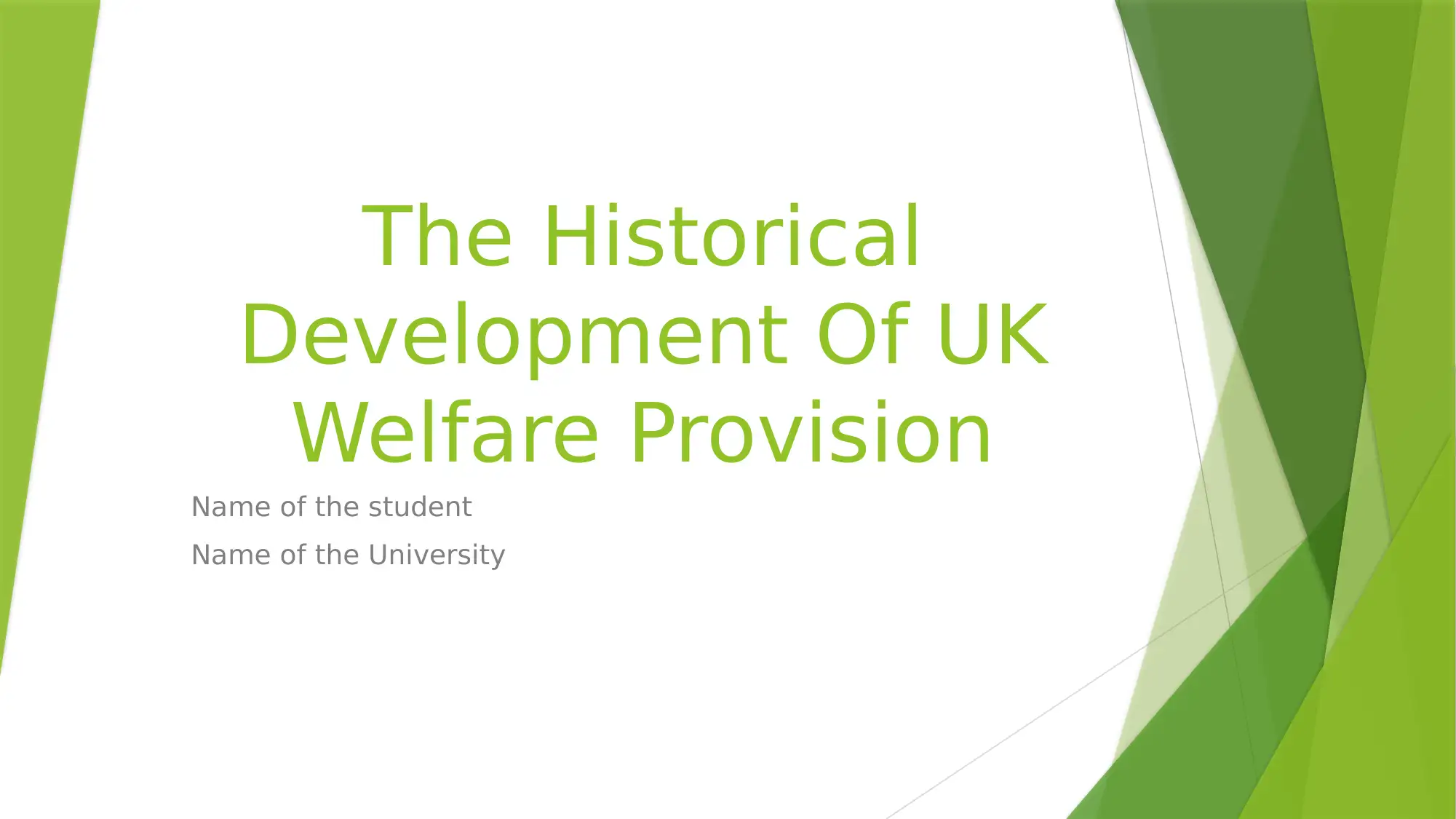
The Historical
Development Of UK
Welfare Provision
Name of the student
Name of the University
Development Of UK
Welfare Provision
Name of the student
Name of the University
Paraphrase This Document
Need a fresh take? Get an instant paraphrase of this document with our AI Paraphraser
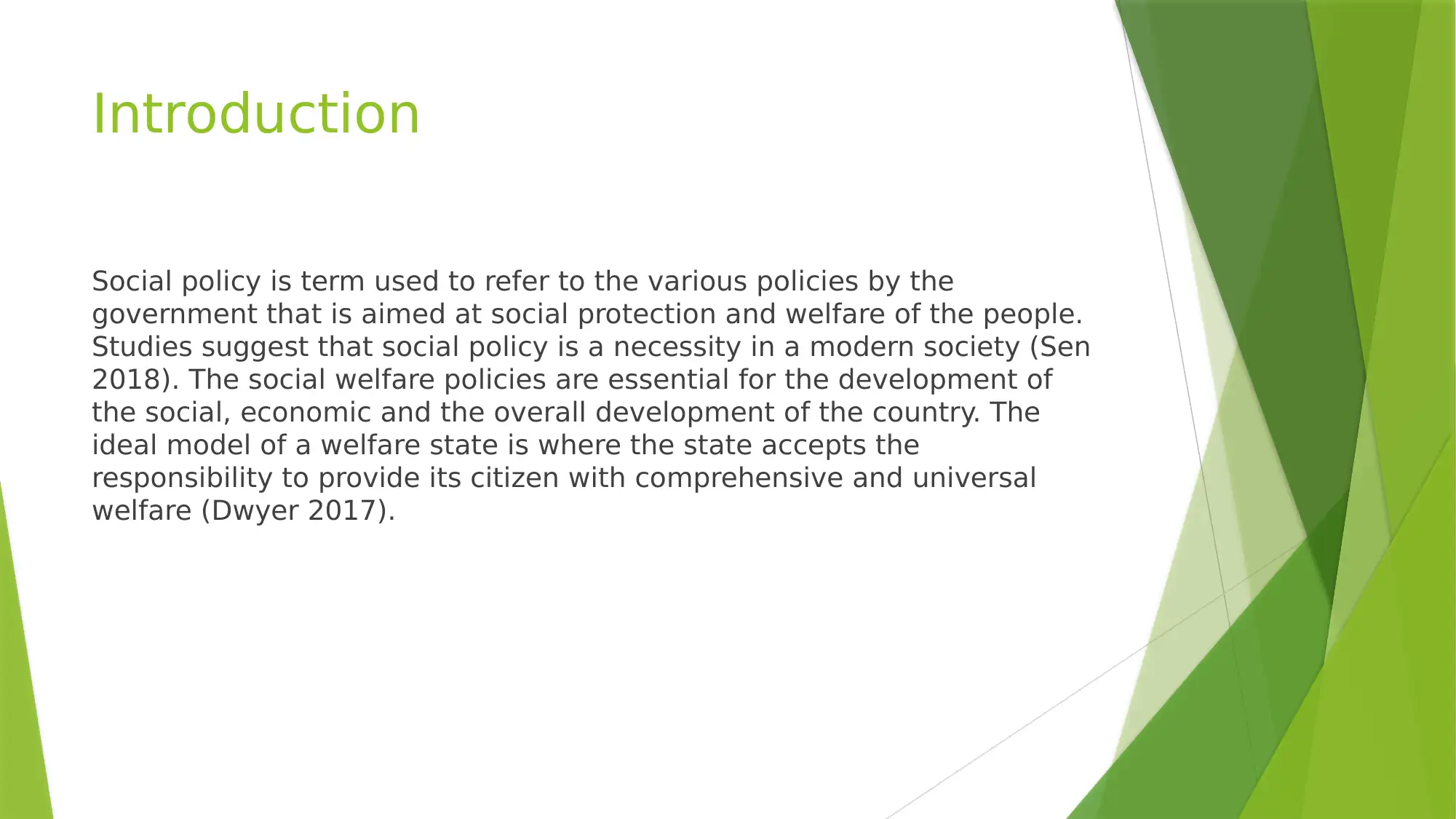
Introduction
Social policy is term used to refer to the various policies by the
government that is aimed at social protection and welfare of the people.
Studies suggest that social policy is a necessity in a modern society (Sen
2018). The social welfare policies are essential for the development of
the social, economic and the overall development of the country. The
ideal model of a welfare state is where the state accepts the
responsibility to provide its citizen with comprehensive and universal
welfare (Dwyer 2017).
Social policy is term used to refer to the various policies by the
government that is aimed at social protection and welfare of the people.
Studies suggest that social policy is a necessity in a modern society (Sen
2018). The social welfare policies are essential for the development of
the social, economic and the overall development of the country. The
ideal model of a welfare state is where the state accepts the
responsibility to provide its citizen with comprehensive and universal
welfare (Dwyer 2017).
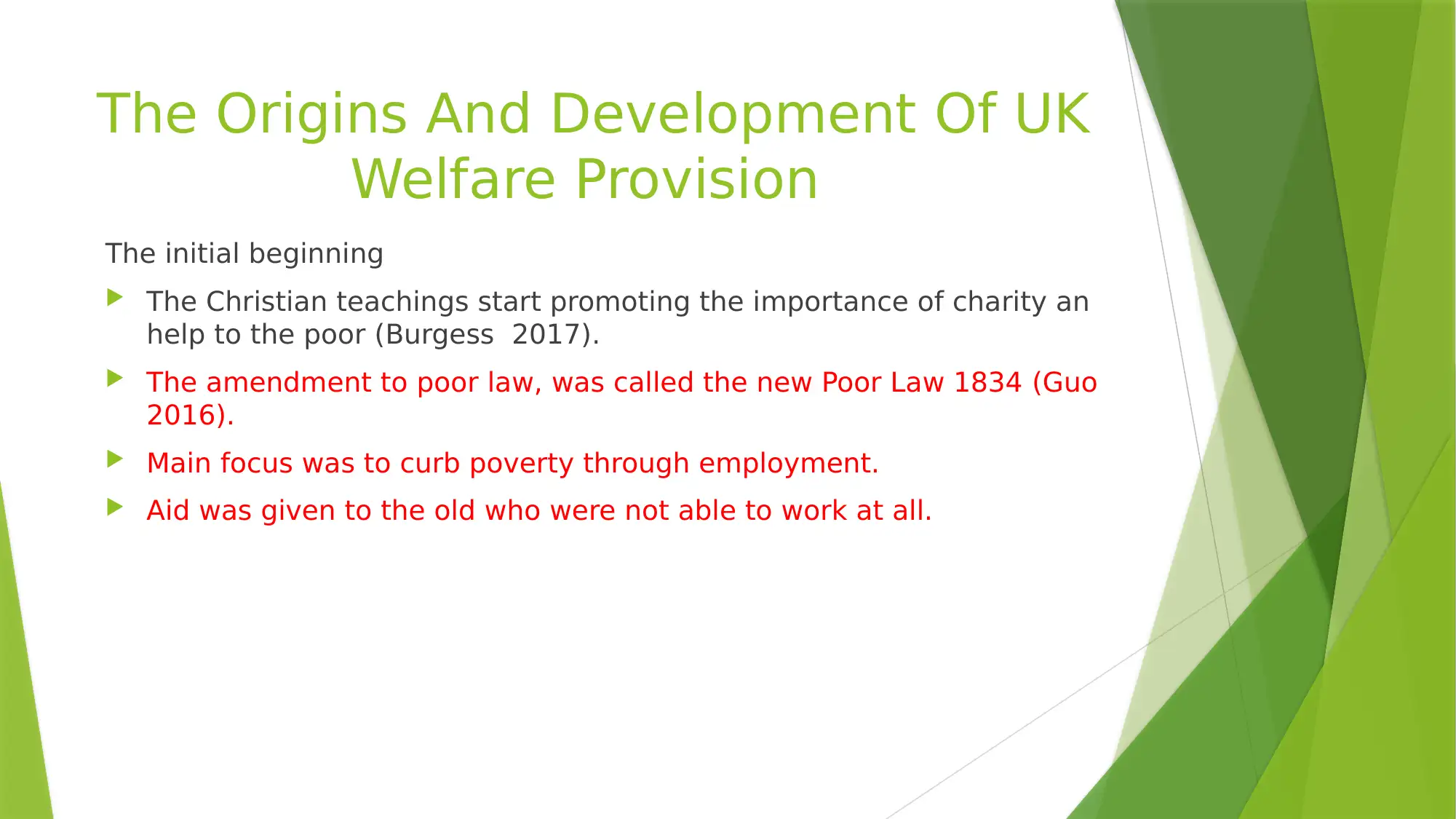
The Origins And Development Of UK
Welfare Provision
The initial beginning
The Christian teachings start promoting the importance of charity an
help to the poor (Burgess 2017).
The amendment to poor law, was called the new Poor Law 1834 (Guo
2016).
Main focus was to curb poverty through employment.
Aid was given to the old who were not able to work at all.
Welfare Provision
The initial beginning
The Christian teachings start promoting the importance of charity an
help to the poor (Burgess 2017).
The amendment to poor law, was called the new Poor Law 1834 (Guo
2016).
Main focus was to curb poverty through employment.
Aid was given to the old who were not able to work at all.
⊘ This is a preview!⊘
Do you want full access?
Subscribe today to unlock all pages.

Trusted by 1+ million students worldwide
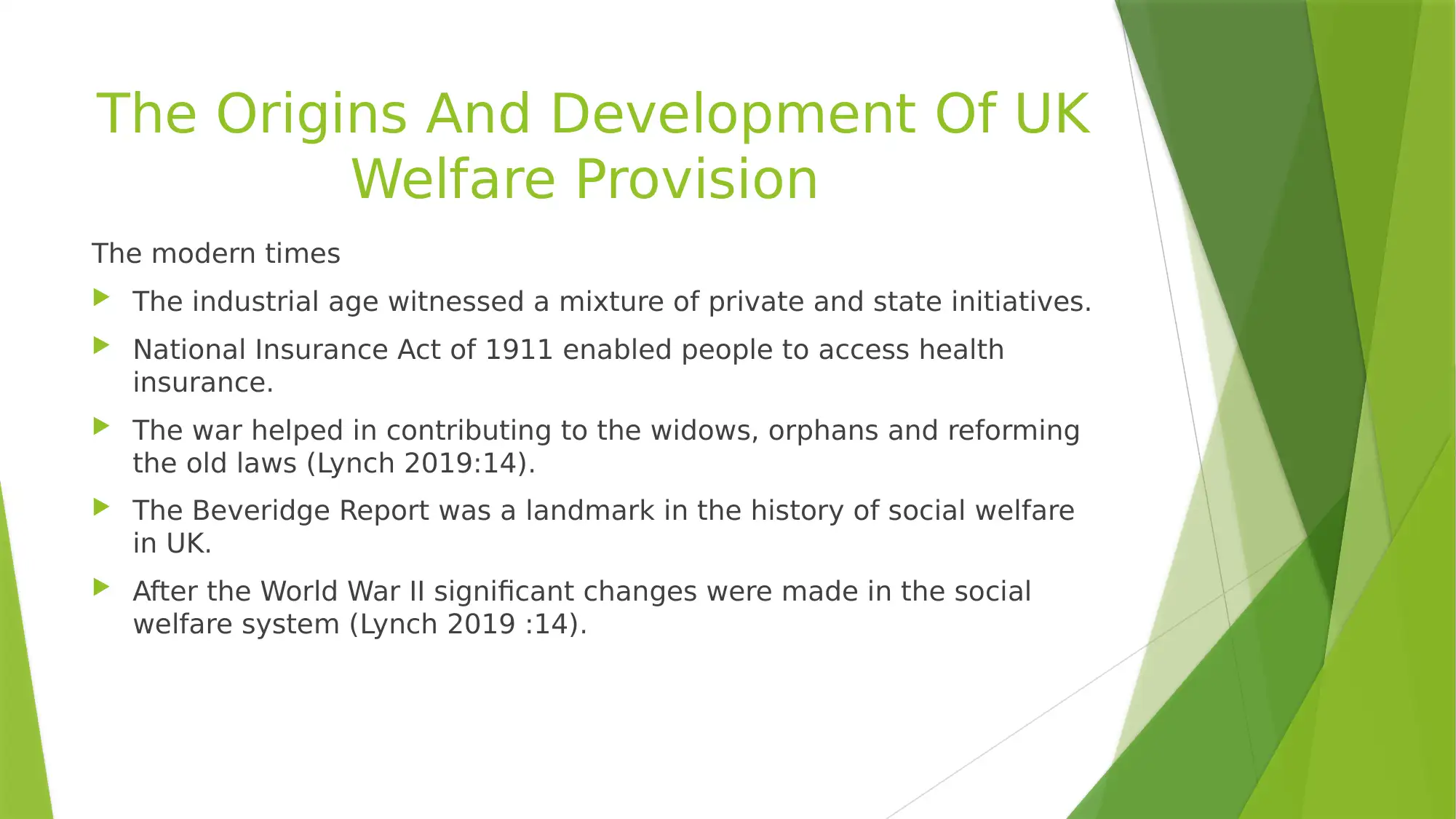
The Origins And Development Of UK
Welfare Provision
The modern times
The industrial age witnessed a mixture of private and state initiatives.
National Insurance Act of 1911 enabled people to access health
insurance.
The war helped in contributing to the widows, orphans and reforming
the old laws (Lynch 2019:14).
The Beveridge Report was a landmark in the history of social welfare
in UK.
After the World War II significant changes were made in the social
welfare system (Lynch 2019 :14).
Welfare Provision
The modern times
The industrial age witnessed a mixture of private and state initiatives.
National Insurance Act of 1911 enabled people to access health
insurance.
The war helped in contributing to the widows, orphans and reforming
the old laws (Lynch 2019:14).
The Beveridge Report was a landmark in the history of social welfare
in UK.
After the World War II significant changes were made in the social
welfare system (Lynch 2019 :14).
Paraphrase This Document
Need a fresh take? Get an instant paraphrase of this document with our AI Paraphraser
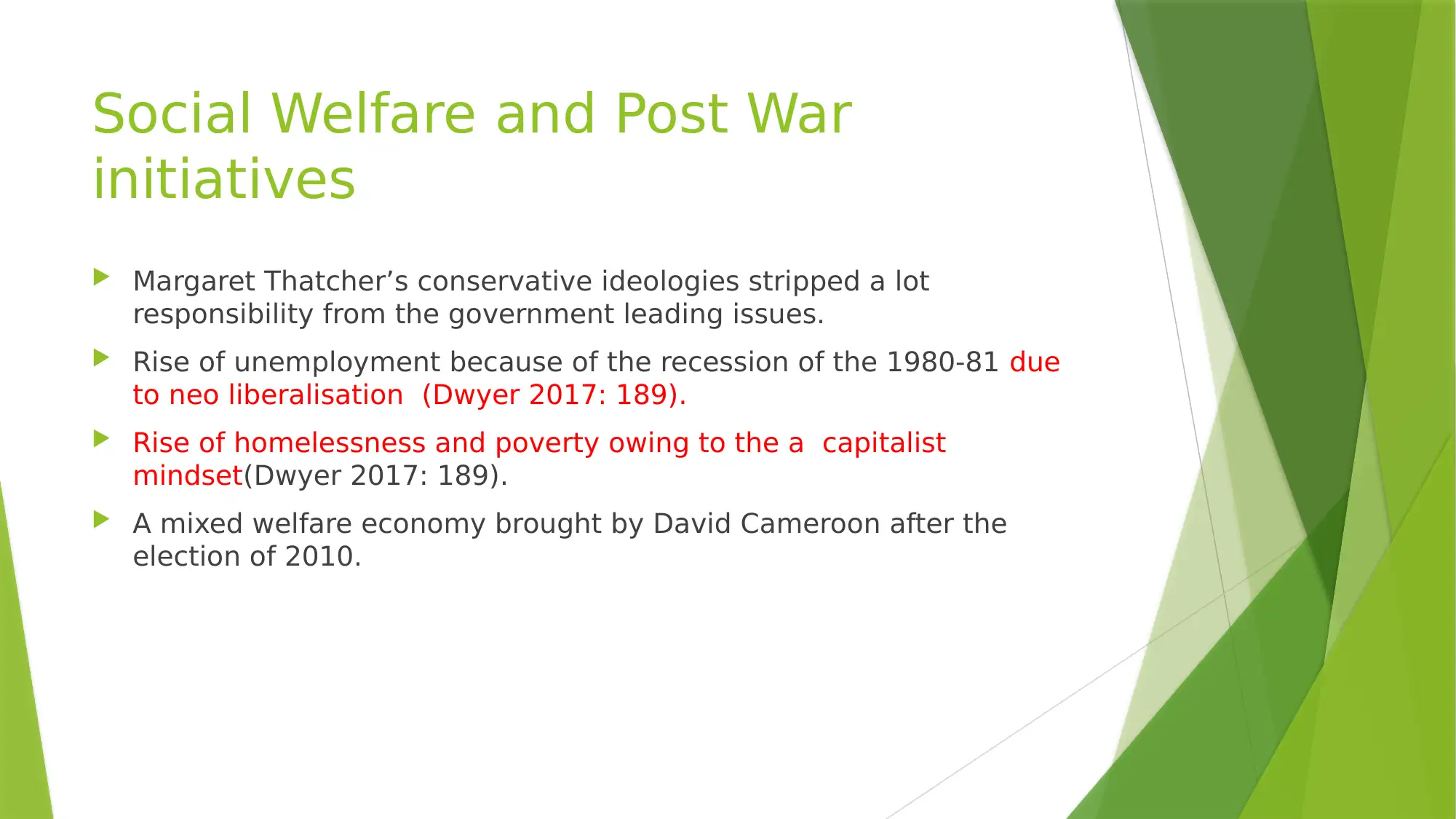
Social Welfare and Post War
initiatives
Margaret Thatcher’s conservative ideologies stripped a lot
responsibility from the government leading issues.
Rise of unemployment because of the recession of the 1980-81 due
to neo liberalisation (Dwyer 2017: 189).
Rise of homelessness and poverty owing to the a capitalist
mindset(Dwyer 2017: 189).
A mixed welfare economy brought by David Cameroon after the
election of 2010.
initiatives
Margaret Thatcher’s conservative ideologies stripped a lot
responsibility from the government leading issues.
Rise of unemployment because of the recession of the 1980-81 due
to neo liberalisation (Dwyer 2017: 189).
Rise of homelessness and poverty owing to the a capitalist
mindset(Dwyer 2017: 189).
A mixed welfare economy brought by David Cameroon after the
election of 2010.
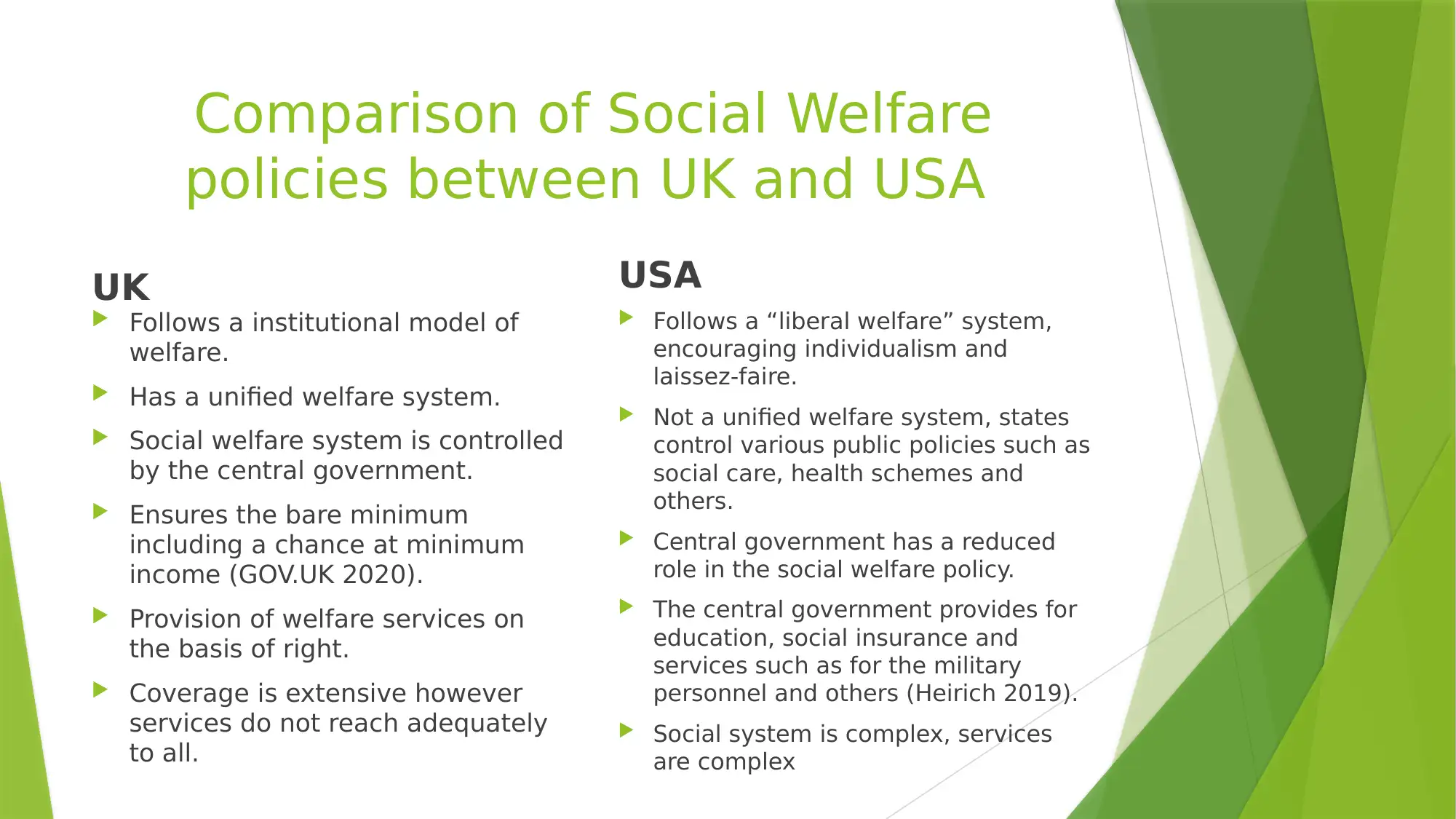
Comparison of Social Welfare
policies between UK and USA
UK
Follows a institutional model of
welfare.
Has a unified welfare system.
Social welfare system is controlled
by the central government.
Ensures the bare minimum
including a chance at minimum
income (GOV.UK 2020).
Provision of welfare services on
the basis of right.
Coverage is extensive however
services do not reach adequately
to all.
USA
Follows a “liberal welfare” system,
encouraging individualism and
laissez-faire.
Not a unified welfare system, states
control various public policies such as
social care, health schemes and
others.
Central government has a reduced
role in the social welfare policy.
The central government provides for
education, social insurance and
services such as for the military
personnel and others (Heirich 2019).
Social system is complex, services
are complex
policies between UK and USA
UK
Follows a institutional model of
welfare.
Has a unified welfare system.
Social welfare system is controlled
by the central government.
Ensures the bare minimum
including a chance at minimum
income (GOV.UK 2020).
Provision of welfare services on
the basis of right.
Coverage is extensive however
services do not reach adequately
to all.
USA
Follows a “liberal welfare” system,
encouraging individualism and
laissez-faire.
Not a unified welfare system, states
control various public policies such as
social care, health schemes and
others.
Central government has a reduced
role in the social welfare policy.
The central government provides for
education, social insurance and
services such as for the military
personnel and others (Heirich 2019).
Social system is complex, services
are complex
⊘ This is a preview!⊘
Do you want full access?
Subscribe today to unlock all pages.

Trusted by 1+ million students worldwide
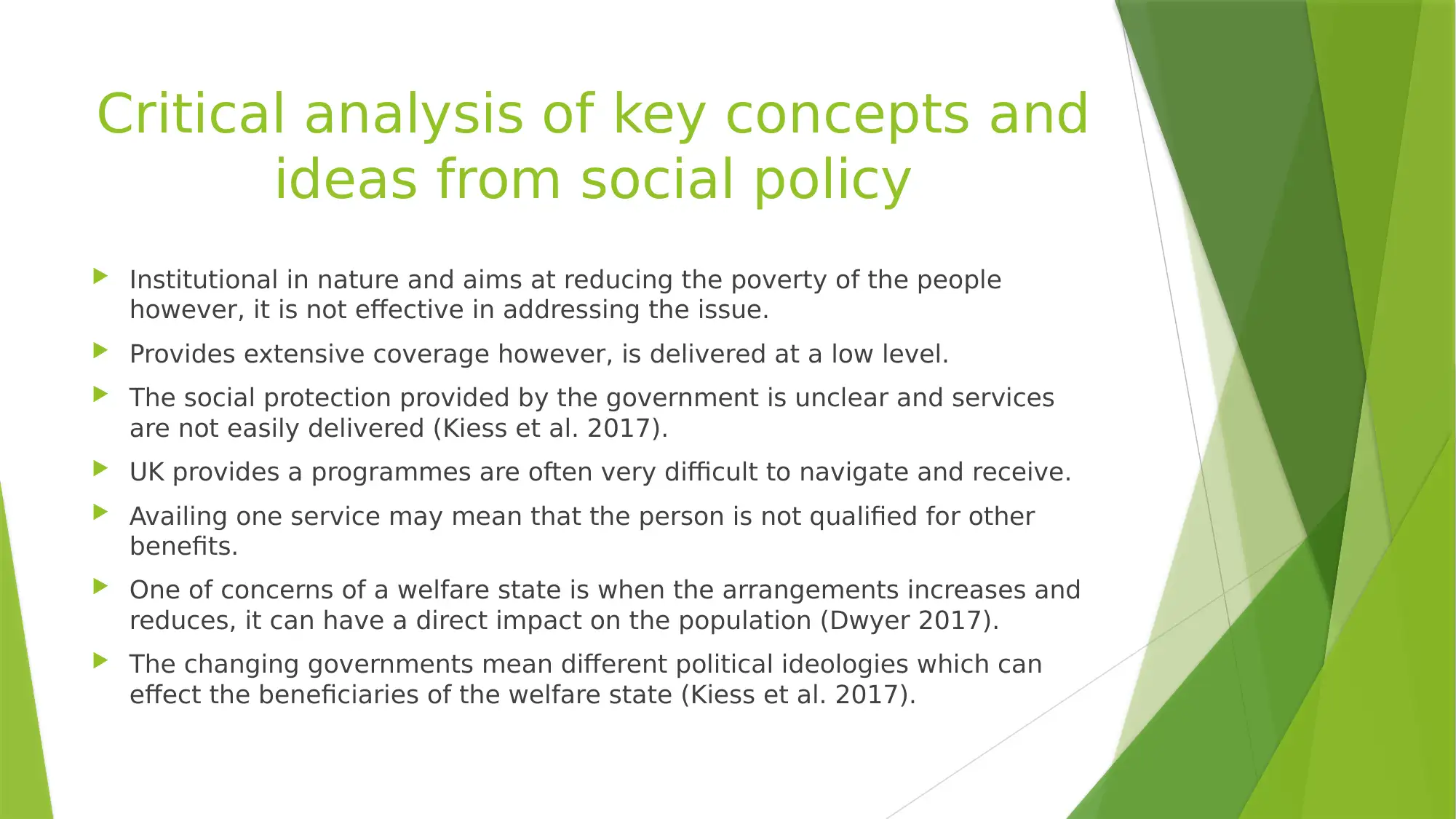
Critical analysis of key concepts and
ideas from social policy
Institutional in nature and aims at reducing the poverty of the people
however, it is not effective in addressing the issue.
Provides extensive coverage however, is delivered at a low level.
The social protection provided by the government is unclear and services
are not easily delivered (Kiess et al. 2017).
UK provides a programmes are often very difficult to navigate and receive.
Availing one service may mean that the person is not qualified for other
benefits.
One of concerns of a welfare state is when the arrangements increases and
reduces, it can have a direct impact on the population (Dwyer 2017).
The changing governments mean different political ideologies which can
effect the beneficiaries of the welfare state (Kiess et al. 2017).
ideas from social policy
Institutional in nature and aims at reducing the poverty of the people
however, it is not effective in addressing the issue.
Provides extensive coverage however, is delivered at a low level.
The social protection provided by the government is unclear and services
are not easily delivered (Kiess et al. 2017).
UK provides a programmes are often very difficult to navigate and receive.
Availing one service may mean that the person is not qualified for other
benefits.
One of concerns of a welfare state is when the arrangements increases and
reduces, it can have a direct impact on the population (Dwyer 2017).
The changing governments mean different political ideologies which can
effect the beneficiaries of the welfare state (Kiess et al. 2017).
Paraphrase This Document
Need a fresh take? Get an instant paraphrase of this document with our AI Paraphraser
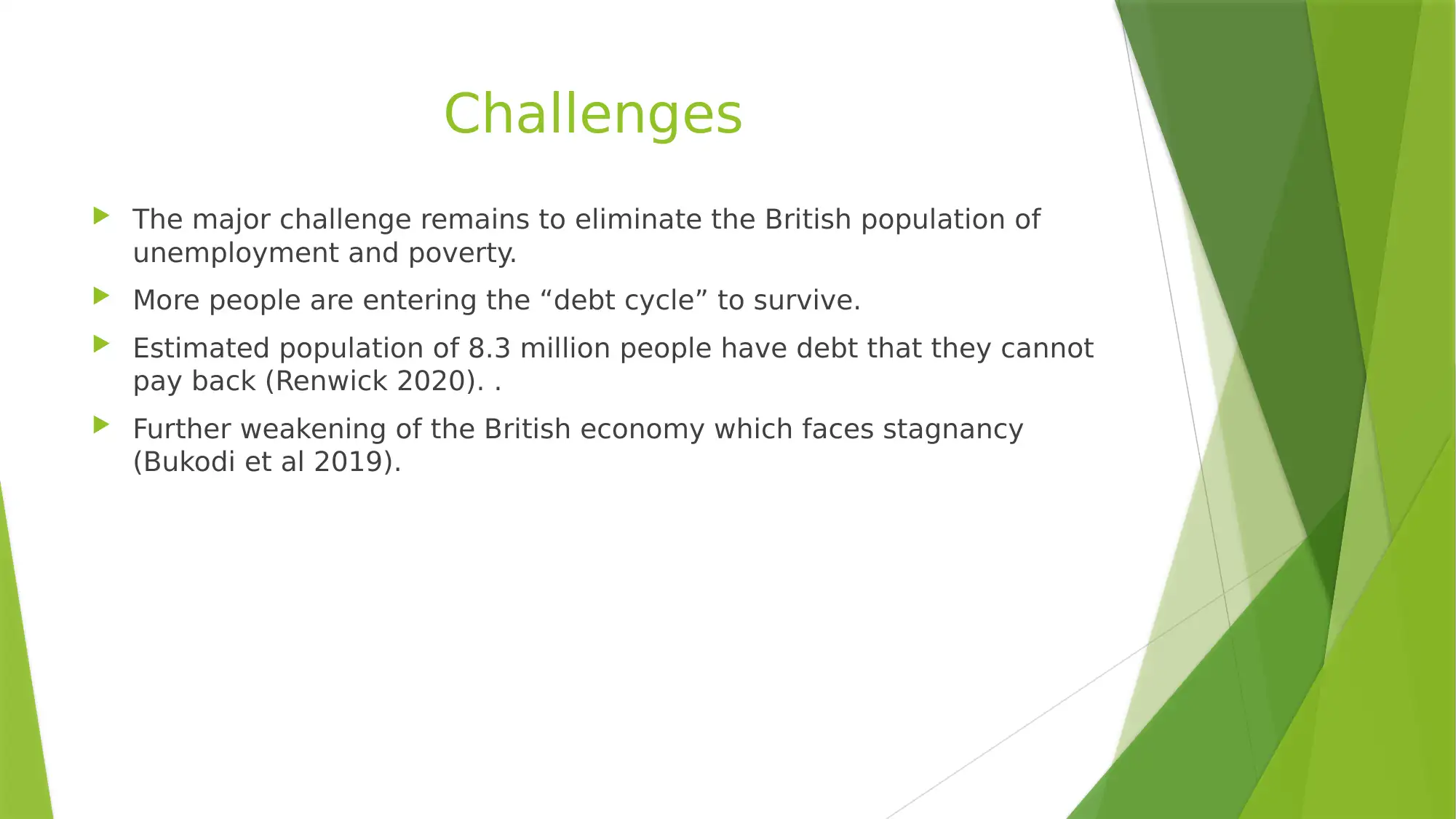
Challenges
The major challenge remains to eliminate the British population of
unemployment and poverty.
More people are entering the “debt cycle” to survive.
Estimated population of 8.3 million people have debt that they cannot
pay back (Renwick 2020). .
Further weakening of the British economy which faces stagnancy
(Bukodi et al 2019).
The major challenge remains to eliminate the British population of
unemployment and poverty.
More people are entering the “debt cycle” to survive.
Estimated population of 8.3 million people have debt that they cannot
pay back (Renwick 2020). .
Further weakening of the British economy which faces stagnancy
(Bukodi et al 2019).
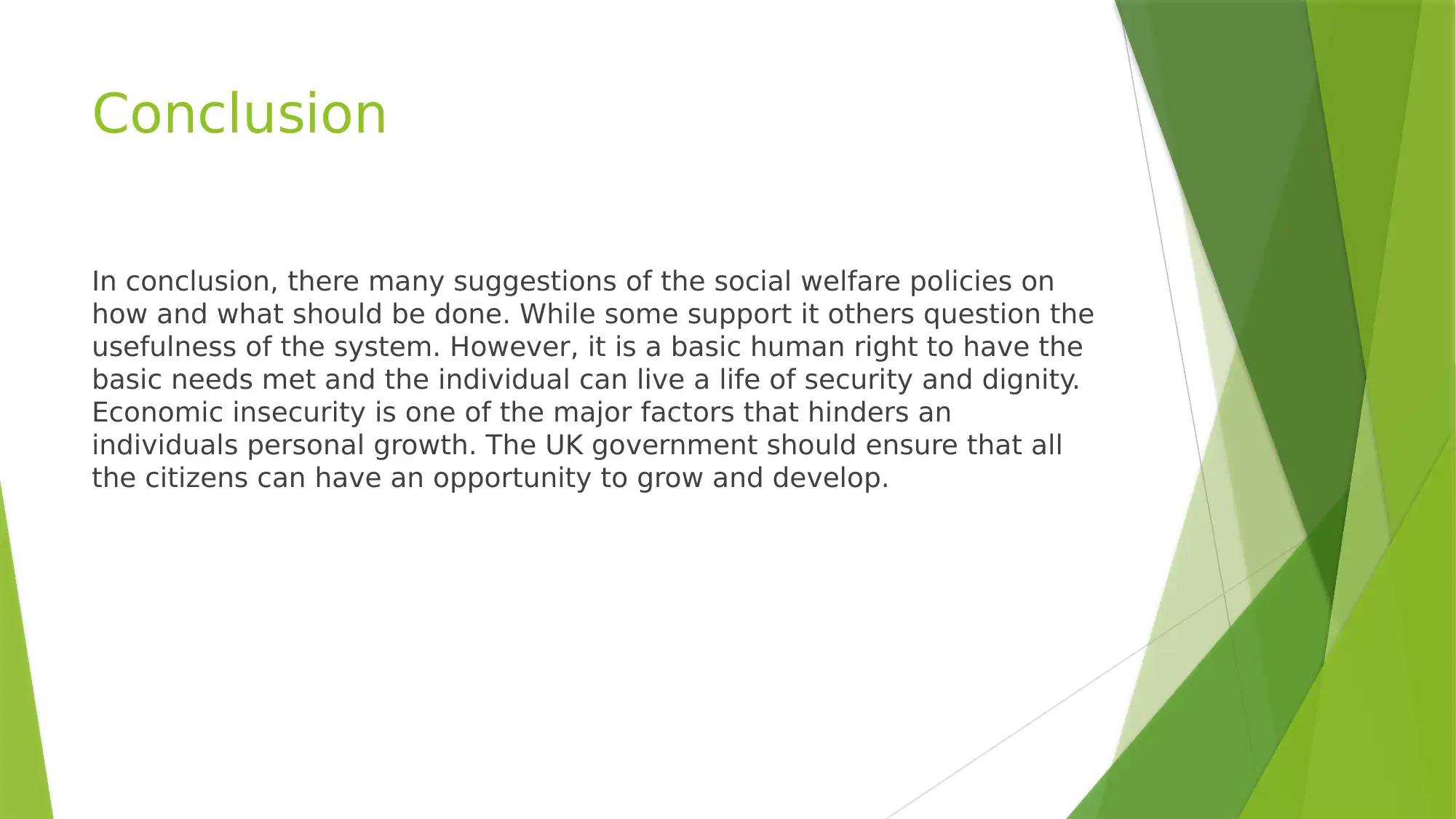
Conclusion
In conclusion, there many suggestions of the social welfare policies on
how and what should be done. While some support it others question the
usefulness of the system. However, it is a basic human right to have the
basic needs met and the individual can live a life of security and dignity.
Economic insecurity is one of the major factors that hinders an
individuals personal growth. The UK government should ensure that all
the citizens can have an opportunity to grow and develop.
In conclusion, there many suggestions of the social welfare policies on
how and what should be done. While some support it others question the
usefulness of the system. However, it is a basic human right to have the
basic needs met and the individual can live a life of security and dignity.
Economic insecurity is one of the major factors that hinders an
individuals personal growth. The UK government should ensure that all
the citizens can have an opportunity to grow and develop.
⊘ This is a preview!⊘
Do you want full access?
Subscribe today to unlock all pages.

Trusted by 1+ million students worldwide
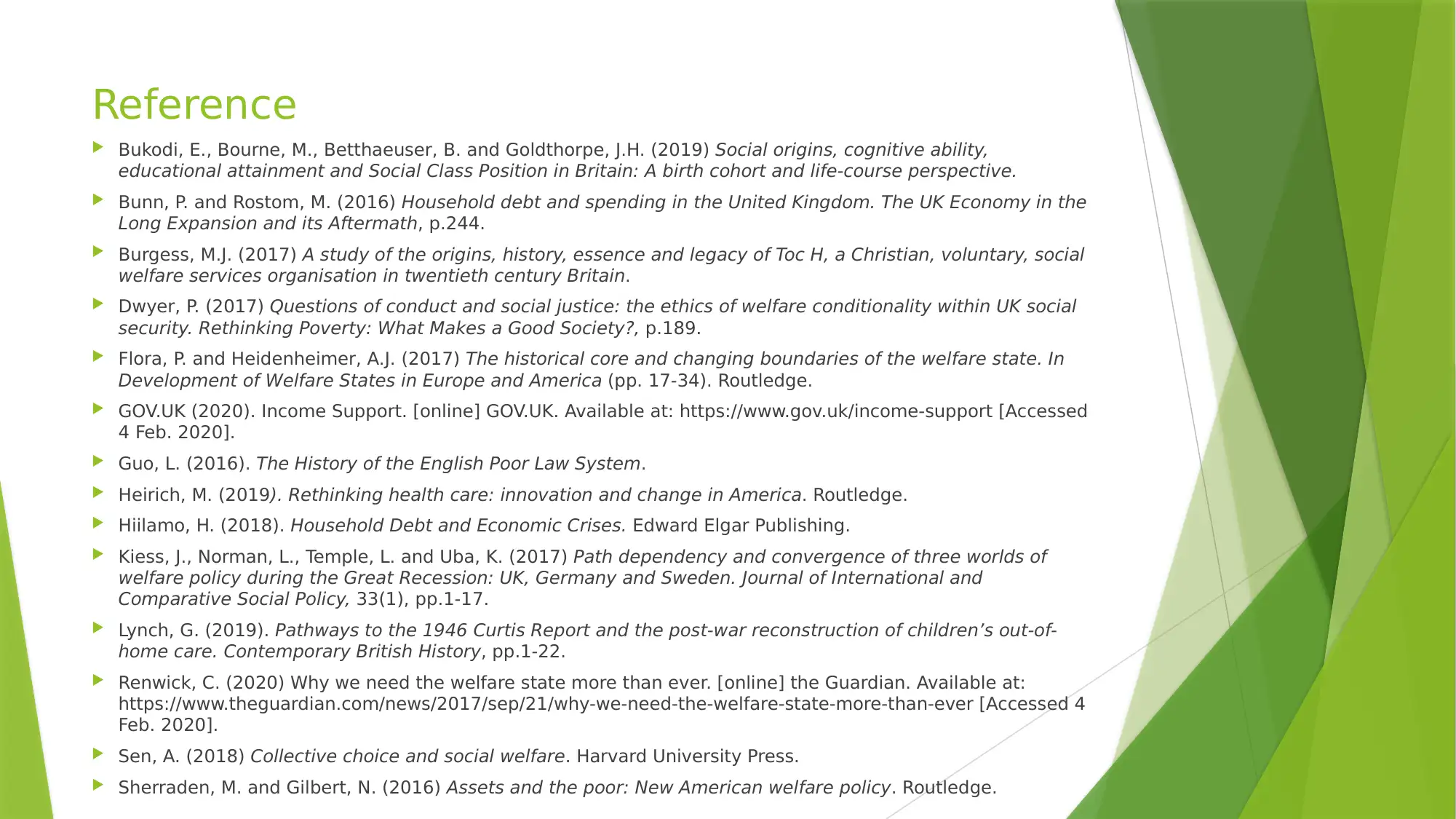
Reference
Bukodi, E., Bourne, M., Betthaeuser, B. and Goldthorpe, J.H. (2019) Social origins, cognitive ability,
educational attainment and Social Class Position in Britain: A birth cohort and life-course perspective.
Bunn, P. and Rostom, M. (2016) Household debt and spending in the United Kingdom. The UK Economy in the
Long Expansion and its Aftermath, p.244.
Burgess, M.J. (2017) A study of the origins, history, essence and legacy of Toc H, a Christian, voluntary, social
welfare services organisation in twentieth century Britain.
Dwyer, P. (2017) Questions of conduct and social justice: the ethics of welfare conditionality within UK social
security. Rethinking Poverty: What Makes a Good Society?, p.189.
Flora, P. and Heidenheimer, A.J. (2017) The historical core and changing boundaries of the welfare state. In
Development of Welfare States in Europe and America (pp. 17-34). Routledge.
GOV.UK (2020). Income Support. [online] GOV.UK. Available at: https://www.gov.uk/income-support [Accessed
4 Feb. 2020].
Guo, L. (2016). The History of the English Poor Law System.
Heirich, M. (2019). Rethinking health care: innovation and change in America. Routledge.
Hiilamo, H. (2018). Household Debt and Economic Crises. Edward Elgar Publishing.
Kiess, J., Norman, L., Temple, L. and Uba, K. (2017) Path dependency and convergence of three worlds of
welfare policy during the Great Recession: UK, Germany and Sweden. Journal of International and
Comparative Social Policy, 33(1), pp.1-17.
Lynch, G. (2019). Pathways to the 1946 Curtis Report and the post-war reconstruction of children’s out-of-
home care. Contemporary British History, pp.1-22.
Renwick, C. (2020) Why we need the welfare state more than ever. [online] the Guardian. Available at:
https://www.theguardian.com/news/2017/sep/21/why-we-need-the-welfare-state-more-than-ever [Accessed 4
Feb. 2020].
Sen, A. (2018) Collective choice and social welfare. Harvard University Press.
Sherraden, M. and Gilbert, N. (2016) Assets and the poor: New American welfare policy. Routledge.
Bukodi, E., Bourne, M., Betthaeuser, B. and Goldthorpe, J.H. (2019) Social origins, cognitive ability,
educational attainment and Social Class Position in Britain: A birth cohort and life-course perspective.
Bunn, P. and Rostom, M. (2016) Household debt and spending in the United Kingdom. The UK Economy in the
Long Expansion and its Aftermath, p.244.
Burgess, M.J. (2017) A study of the origins, history, essence and legacy of Toc H, a Christian, voluntary, social
welfare services organisation in twentieth century Britain.
Dwyer, P. (2017) Questions of conduct and social justice: the ethics of welfare conditionality within UK social
security. Rethinking Poverty: What Makes a Good Society?, p.189.
Flora, P. and Heidenheimer, A.J. (2017) The historical core and changing boundaries of the welfare state. In
Development of Welfare States in Europe and America (pp. 17-34). Routledge.
GOV.UK (2020). Income Support. [online] GOV.UK. Available at: https://www.gov.uk/income-support [Accessed
4 Feb. 2020].
Guo, L. (2016). The History of the English Poor Law System.
Heirich, M. (2019). Rethinking health care: innovation and change in America. Routledge.
Hiilamo, H. (2018). Household Debt and Economic Crises. Edward Elgar Publishing.
Kiess, J., Norman, L., Temple, L. and Uba, K. (2017) Path dependency and convergence of three worlds of
welfare policy during the Great Recession: UK, Germany and Sweden. Journal of International and
Comparative Social Policy, 33(1), pp.1-17.
Lynch, G. (2019). Pathways to the 1946 Curtis Report and the post-war reconstruction of children’s out-of-
home care. Contemporary British History, pp.1-22.
Renwick, C. (2020) Why we need the welfare state more than ever. [online] the Guardian. Available at:
https://www.theguardian.com/news/2017/sep/21/why-we-need-the-welfare-state-more-than-ever [Accessed 4
Feb. 2020].
Sen, A. (2018) Collective choice and social welfare. Harvard University Press.
Sherraden, M. and Gilbert, N. (2016) Assets and the poor: New American welfare policy. Routledge.
Paraphrase This Document
Need a fresh take? Get an instant paraphrase of this document with our AI Paraphraser

1 out of 11
Related Documents
Your All-in-One AI-Powered Toolkit for Academic Success.
+13062052269
info@desklib.com
Available 24*7 on WhatsApp / Email
![[object Object]](/_next/static/media/star-bottom.7253800d.svg)
Unlock your academic potential
Copyright © 2020–2026 A2Z Services. All Rights Reserved. Developed and managed by ZUCOL.





